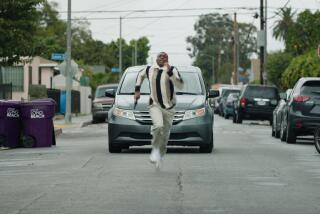More Offensive Stereotypes Than Humor in ‘3 Strikes’
- Share via
Yo, word up, dog. Dis joint whacked, ni . . . oops. Sorry. But I just saw the new rap-flavored comedy, “3 Strikes,” and it takes a while for the experience to wear off. Until it does, I won’t be fit for company.
This is the latest attempt by the bad boyz of hip-hop to transfer the gangsta-rap sensibility to celluloid. On that count, this movie would have to be considered a success. It’s all here--gangsta rap’s lewdness, the loudness, the violence, the oafish displays of self-loathing masquerading as cultural celebration. It’s perfect.
The bad news is that it’s also vile, not to mention sophomoric and unfunny.
Rob Douglas (Brian Hooks) is a dim but good-natured young thug imprisoned for an unspecified crime who finds himself immediately in trouble upon his release. A friend driving a stolen car picks him up from prison, then gets into a gunfight with the police.
Doug must avoid capture at all costs because he’s already been convicted of two felonies. Under California’s three-strikes law, he could be sentenced to life in prison if he’s convicted again. Gang members also are out to get him for running away instead of staying to shoot it out with the cops.
It isn’t a problem that the movie--which opened Wednesday but wasn’t screened for the press--depicts a casually amoral universe in which pathology is the norm and decency is unknown. That sounds like half the movies coming out of Hollywood.
But the uniformly lazy, shuffling, bellowing, brawling, stealing, oversexed, pot-smoking or alcoholic black characters who populate this movie’s universe are easily as offensive as the movie stereotypes that proliferated in the pre-Civil Rights era. “3 Strikes” even has Amos ‘n’ Andy-style eyeball popping and double takes.
And the soundtrack song titles sound like something the Ku Klux Klan dreamed up to insult black people. “Where Dey At” is one song. “Where Da Paper At” is another.
Rappers like to say that their work merely describes life as they know it--they’re chronicling the thug life, not glorifying it. And writer-director D.J. Pooh, an ex-rapper-music producer who co-wrote Ice Cube’s “Friday” movie, describes “3 Strikes” in interviews as a comic critique of the judicial system.
But in movies like this, and Cube’s “Player’s Club” and “Friday” comedies as well as hard-core films such as “Belly” (1998), what they’re really doing is draining their black characters of their humanity (turning them into monsters or buffoons) and then presenting them to audiences as representations of authentic black experience.
What’s troubling is that the target audiences tend to be young people who either 1) see just enough of their own lives reflected in these movies to think the characters are fit for emulation or 2) know nothing about the lives of black folk and so walk away thinking they’ve been educated.
In the midst of the uproar over the paucity of nonwhite characters on television, the movies have been experiencing a mini-boom of low-budget, black-themed movies, many of them directed by, produced by or starring rappers. But I’d take invisibility over the demeaning portrayals in these movies any day.
* MPAA rating: R for pervasive language, strong sexual content, some drug use and a brief scene of violence. The language is as raw as can be imagined, with profanity or racial epithets in nearly every sentence.
‘3 Strikes’
Brian Hooks: Rob
N’Bushe Wright: Juanita
Faizon Love: Tone
E40: Mike
Starletta DuPois: Moms
George Wallace: Pops
David Alan Grier: Jenkins
An MGM Distribution Co. presentation of an Absolute Entertainment/Motion Picture Corp. of America production in association with Lithium Entertainment Group. Director and screenplay D.J. Pooh. Producer Marcus Morton. Executive producers Julio Caro, Benny Medina and Brad Krevoy. Cinematographer John W. Simmons. Production designer Thomas Fichter. Editor John Carter. Music by the Angel. Music supervisor Andrew Shack. Costume designer Tracey White. Running time: 1 hour, 23 minutes.
Now playing in general release.
More to Read
Only good movies
Get the Indie Focus newsletter, Mark Olsen's weekly guide to the world of cinema.
You may occasionally receive promotional content from the Los Angeles Times.










